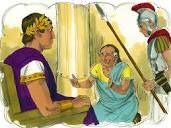
Peter probably thought he was being very generous in suggesting to Jesus that he might forgive his brother seven times. Rabbinical teaching had required only three times. Forgiveness, however, was at the core of Jesus’ teaching.
The talent was worth about 6,000 denarii and one denarius was a day’s wages, so the servant would have to work 6,000 days to pay off one talent! Both he and his master knew that he could never have paid off that debt. The story, like all the parables Jesus told, illustrates a point very clearly. We owe God a debt that we can never pay off. Jesus, however, has paid it for us by His death on the cross. He lived on earth as God’s Word incarnate to show us how we were meant to live. He himself forgave freely: even his tormentors who crucified him. We, in our turn, must forgive those who wrong us, just as we hope those whom we have hurt will forgive us. We see the harm done by those who exact vengeance. Families frequently develop toxic relationship because their members allow resentments to fester. The same happens with neighbours and even more so between nations.
Forgiveness acts like the poisonous serpent God instructed Moses to make and raise on a pole (Numbers 21:8-9). It has a healing quality that brings a peace for both the one offended and the offender. We raise our eyes to the cross to see forgiveness in action.